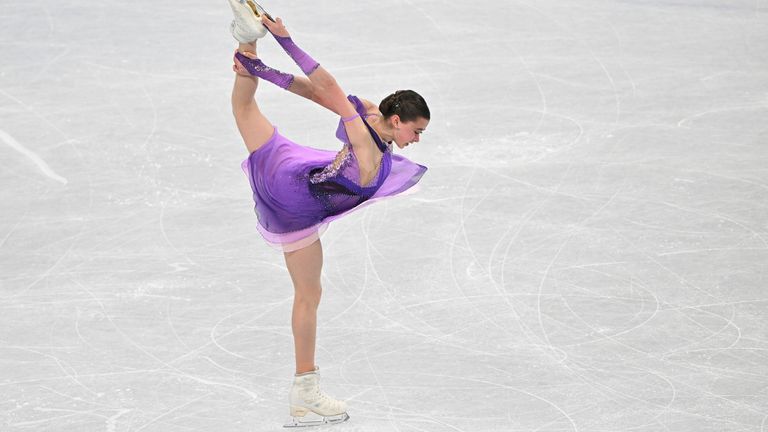Russian skater Kamila Valieva qualified in first place for Thursday's free skate - the final element of the women's individual figure skating competition - after being cleared to skate, despite a positive drugs test in December.
The 15-year-old tested positive for the banned heart medication trimetazidine on Christmas Day. However, Valieva found out on Monday that she would be able to compete following a decision by the Court of Arbitration for Sport (CAS).
The CAS cited "exceptional circumstances" for its decision. They included Valieva's status as a "protected person" under the World Anti-Doping Code, "serious issues" in the process of notifying Valieva of her result, and the fact a suspension could cause her "irreparable harm".
Prior to her short program performance, Valieva had said that she was "emotionally tired" and that the past days had been "very difficult for her".
She made a slight mistake on the landing for her first jump, a Triple Axel, but recomposed herself quickly to complete her routine cleanly and strongly.
Valieva topped the leaderboard ahead of her compatriot Anna Shcherbakova (80.20), with Japan's Kaori Sakamoto (79.84) in third position.
The free skate on Thursday is the final element of the women's singles figure skating competition, with skaters allowed four minutes to showcase their creativity.
Great Britain's Natasha McKay failed to qualify after recording a score of 52.54.
In total, 25 athletes progressed from the short program, an additional athlete to normal due to the ongoing investigations regarding Valieva.
Valieva has argued that her positive drug test was caused by a mix-up with her grandfather's heart medication, according to Denis Oswald, the International Olympic Committee's (IOC) permanent chair of the disciplinary commission.
She said the days leading up to her being cleared to compete in the short program left her emotionally fatigued.
"These (past few) days have been very difficult for me," she told Russia's Channel One.
"It's as if I don't have any emotions left. I am happy but at the same time I am emotionally tired."
The 15-year-old's emotions were clear following her competition-leading skate, as she let the tears flow after its conclusion on the ice.
No medal ceremony will take place
The International Olympic Committee (IOC) has acknowledged the Court of Arbitration for Sport's ruling but has also confirmed there will be no medal ceremony for the women's singles competition if Valieva places in the top three.
The medals have not been awarded for the women's team competition either, in which Valieva was part of the Russian Olympic Committee's team.
"The IOC will, in consultation with the athletes and NOCs (national Olympic committees) concerned, organise dignified medal ceremonies once the case of Ms Valieva has been concluded," the IOC statement said.
Paris 2024 to make sure Valieva case does not hit the next Games
The organisers of the Paris 2024 Olympics have vowed to avoid a repeat of the Valieva case at their own Summer Games.
"Paris 2024 is 100 per cent committed to the fight against doping and is working in close coordination with all stakeholders to ensure the fairness of the competitions in 2024 and the protection of athletes," they said in a statement.
"We must use this situation (the Valieva case) to make sure that it does not happen again.
"Our top priority will be the development and execution of an effective anti-doping program that protects the rights of athletes and the integrity of competitions."

